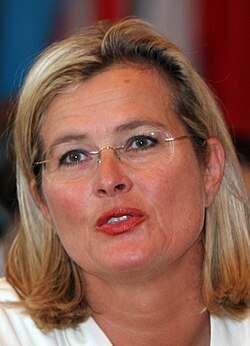 Saint Ursula and Her Maidens by Niccolò di Pietro, circa 1410. | |
| Pronunciation | /ˈɜːrsjʊlə/ German: [ˈʊʁzula] |
|---|---|
| Gender | Feminine |
| Language | German, English |
| Origin | |
| Language | Latin |
| Word/name | ursa |
| Meaning | "little bear" |
| Other names | |
| Variant forms | Uschi, Usch, Urs |





Ursula is a feminine given name in several languages. The name is derived from a diminutive of the Latin ursa, which means "bear". In the English-speaking world, the name was most common in the 16th century, but has since become relatively rare, although its use has been influenced since the twentieth century by the Swiss-born actress Ursula Andress (born 1936). [1] It was among the most popular names for newborn girls in Germany from the 1920s to the 1950s. [2] Ulla, Ursel, and Uschi are German short forms of the name.
Contents
Ursula is a villain in the 1989 Disney animated film The Little Mermaid and its 2023 live-action remake The Little Mermaid . [3] [4]
Other forms of the name include: